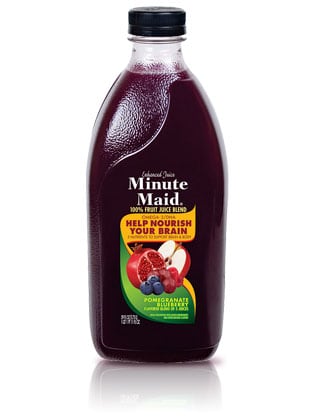California pomegranate juice maker Pom Wonderful sued Coke in 2008 under the Lanham Act (which polices false advertising), accusing it of duping consumers into believing its Minute Maid “Pomegranate Blueberry Flavored Blend of 5 Juices” contained mostly pomegranate and blueberry when it actually was made up of 99.4% apple and grape juices, and challenging its name, labeling, marketing and advertising.
The case reached a 9th Circuit Court of Appeals in San Francisco, which in May 2012 ruled in favor of Coke and denied Pom Wonderful a petition to rehear the case. The court of appeals ruled that the FDCA and its regulations barred the name and labeling aspects of Pom’s claim made under the Lanham Act.
On Friday, against the recommendation of the Solicitor General, the Supreme Court granted a petition for writ of certiorari to hear the case, which will be argued in April and decided in June.

9th Circuit decision poses ‘very real prospect’ that FDA labeling could prevent attacks on deceptiveness
Leading food law attorney Jonathan Emord told FoodNavigator-USA he’s troubled by the prospect of FDA labeling pre-empting efforts to quash deceptive labeling.
“The 9th Circuit decision upholding the district court poses, among other problems, the very real prospect that FDA labeling regulation, which continues to proliferate, could prevent all manner of attacks concerning deceptiveness under the Lanham Act based on label content,” Emord said. “That position is untenable in law and logic, it seems to me, because separate and apart from the question of whether a product may include reference to multiple juice ingredients on its label is the question of whether in any particular case doing so is deceptive.”
He added that in instances where deceptive advertising and promotion are present on product labels—“whereby consumers are led to believe, for example, that a product contains meaningful amounts of pomegranate juice when it does not”—FDCA labeling provisions should not be construed to trump the Lanham Act.
Pom: Decision undermines transparency
A spokesperson for Pom Wonderful told FoodNavigator-USA that the company is pleased the Supreme Court will review the decision “that a food producer is immune from suits for false statements on its product label. The court of appeals’ decision undermines the transparency that health-conscious consumers rightly expect so they can make informed decisions about what they eat and drink. We are hopeful that the court will rule in POM’s favor, sending a clear message to all food companies that they cannot engage in false advertising through their product labels.”
Coca-Cola issued a statement of its own on Monday, saying, “We are confident our labeling fully complies with applicable FDA regulations, as the lower courts have consistently found. The court of appeals issued a well-reasoned decision rejecting Pom's claims as meritless, and we look forward to the Supreme Court's careful review of that decision."
‘Case could significantly impact future litigation’
“This will obviously be an important case to follow,” noted FDA lawyer Ivan Wasserman at Washington, DC-based Manatt. “There is tension between the FDA's role in promulgating and enforcing rules designed to prevent consumer deception, and the courts' role in deciding disputes between private litigants about whether a label that complies with FDA rules is nevertheless deceptive or otherwise problematic under other laws.
“It remains to be seen how broad or narrow the Supreme Court's decision will be, but it certainly could significantly impact future litigation.”
The decision might not, however, have much effect on class action litigation because consumer class action complaints are not generally brought pursuant to the Lanham Act as consumers lack standing to sue under this statute, as attorneys from law firm Davis Wright Tremaine LLP pointed out in an article on the case in Lexology.
Two justices did not take part in the vote
Supreme Court Justices Samuel Alito and Stephen Breyer did not take part in the vote to grant cert, which suggests that they also will not participate in the case at the merits stage, as the FDA Law Blog observed this morning.
Emord added: “It is always an ominous sign for a party when the Supreme Court accepts cert in a case decided in that party’s favor at both the district and appeals court levels. It could be that a majority of the justices voted in favor of accepting cert for a very limited purpose unknown to us.”
